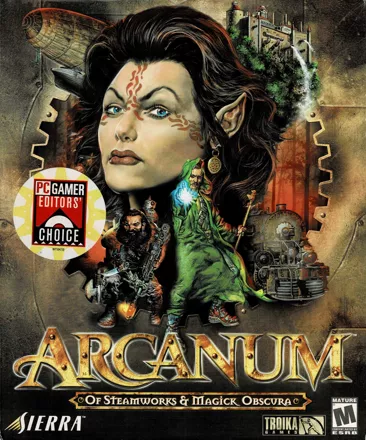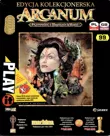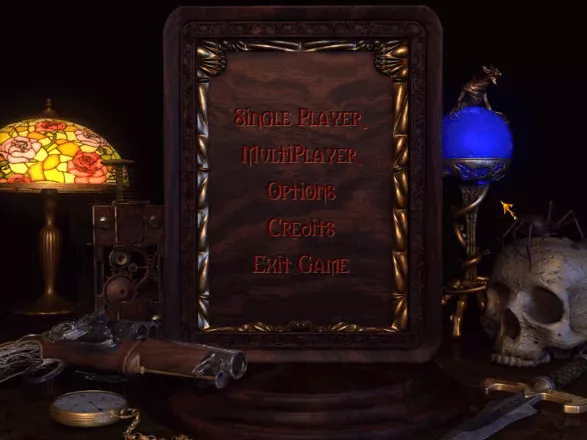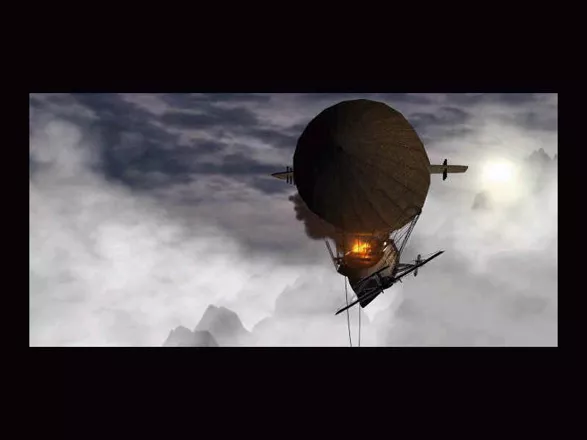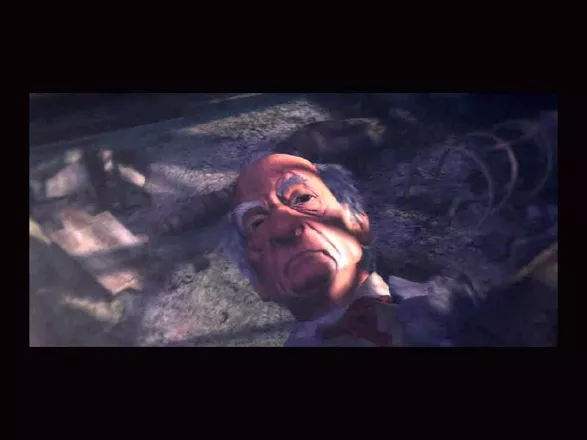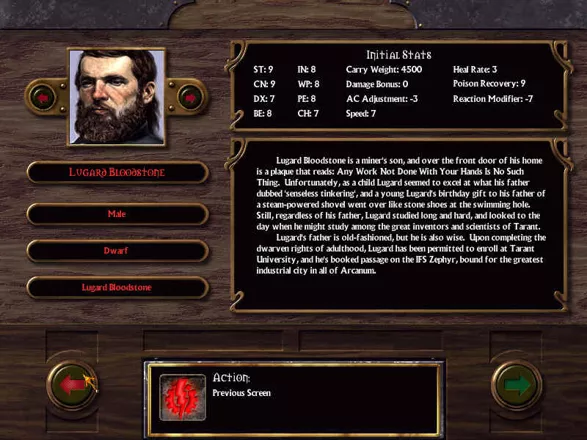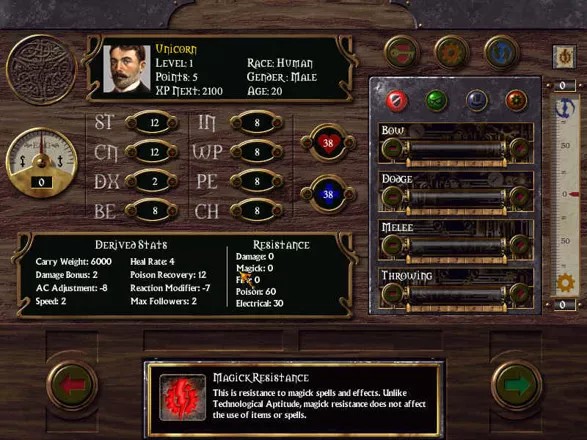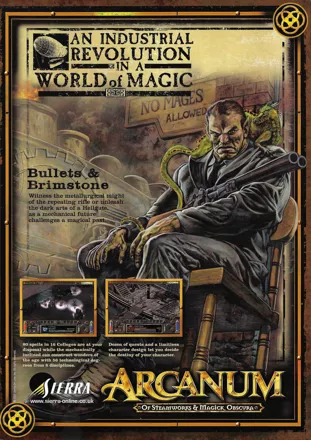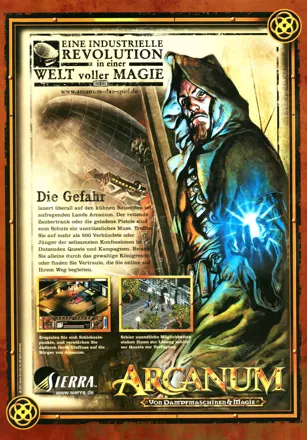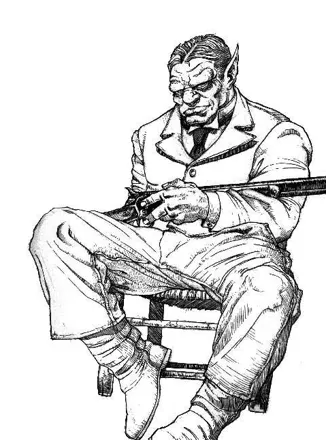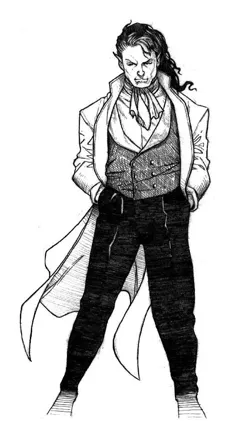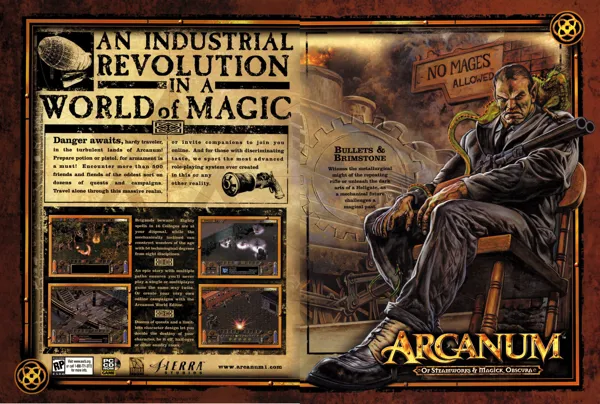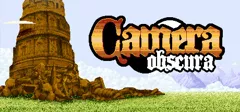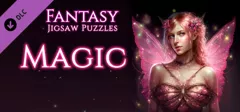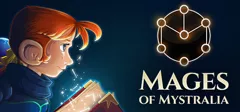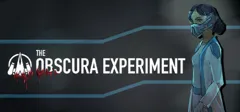Arcanum: Of Steamworks & Magick Obscura
Description official descriptions
The luxury zeppelin IFS Zephyr begins her maiden voyage from Caladon in the Kingdom of Arland to Tarant, one of the largest cities in the technologically advanced Unified Kingdom. Suddenly, while the zeppelin is cruising over mountains, two monoplanes attack it and eventually shoot it down. The two half-ogre attackers die in flames along with all their victims except two who miraculously survived. However, one of them, an old gnome, is mortally wounded. Just before he dies, he gives a silver ring to the other survivor and tells him to "find the boy". The witness of the crash, a man named Virgil, declares that the now only survivor is "The Living One", a reincarnation of a deity, and offers to follow him wherever he goes. The hero begins a long and perilous search for the mysterious boy, the origins of the silver ring, and the unknown enemy who was behind the attack on the zeppelin.
Arcanum is a role-playing game similar in concept and many gameplay principles to Fallout. It is set in a unique world, which can be described as mixture between Tolkienesque fantasy, steampunk technology and elements of British and North American culture of the 19th century: dwarves may carry molotov cocktails, and a half-orc protagonist can travel by train between Victorian-like cities. Magic and technology are opposed to each other; most humans and dwarves embrace technology, while some elf clans stick to the old ways and consider scientific progress evil.
In the beginning of the game the player creates the main character, choosing from a variety of races, attributes, magical or technological disciplines, social skills, backgrounds, etc. When the character levels up, the player can increase his main parameters as well as any available skills. Like in Fallout games, the player directly controls only one character; however, companions who join the party may be given orders, and their inventory can be managed by the player.
The game is open-ended: the player is free to explore the vast world from the onset, undertaking a large amount of side quests or following the main story. Social interaction plays a significant role: depending on the player character's charisma and intelligence attributes, as well as persuasion skill, many problems can be solved in a non-violent way. The amount of companions willing to follow the protagonist also depends on the latter's charisma rating; companions may also leave the party if they disagree with the hero's behavior.
The player can select one of the three combat modes for the game: real-time, turn-based, and fast-paced turn-based. Turn-based mode is similar to the combat in Fallout games: characters require action points to move, attack, or cast spells.
The game includes an editor called WorldEdit, which allows players to create their own maps, campaigns, and non-playable characters. Objects from the base game can be carried across to the player-created scenario. The scenery editor allows players to create their own objects. It is also possible to set and change game variables, i.e. the amount of skill points required to perform a specific task.
Spellings
- 奥秘:技术与魔法 - Chinese spelling (simplified)
Groups +
- BestSeller Series (Cendant / Havas / Vivendi Universal) releases
- Fantasy creatures: Dwarves
- Fantasy creatures: Elves
- Fantasy creatures: Gnomes
- Fantasy creatures: Halflings / Hobbits
- Fantasy creatures: Orcs
- Gameplay feature: Alchemy
- Gameplay feature: Brothels
- Gameplay feature: Character development - Skill distribution
- Gameplay feature: Gambling
- Gameplay feature: Karma meter
- Gameplay feature: Multiple endings
- Middleware: Bink Video
- Physical Bonus Content: World Map
- Protagonist: Female (option)
- Sound engine: AIL/Miles Sound System
Screenshots
Promos
Videos
Add Trailer or Gameplay Video +1 point
See any errors or missing info for this game?
You can submit a correction, contribute trivia, add to a game group, add a related site or alternate title.
Credits (Windows version)
157 People (118 developers, 39 thanks) · View all
| Project Leader | |
| Lead Programming | |
| Programming | |
| Design | |
| Animation | |
| [ full credits ] | |
Reviews
Critics
Average score: 79% (based on 61 ratings)
Players
Average score: 4.0 out of 5 (based on 168 ratings with 13 reviews)
An Enriching Yet Ultimately Flawed Experience
The Good
Let me preface this review by admitting that my relationship with Arcanum is... strained. It has taken me multiple attempts at playing the game over a period of nearly seven years finally to muster up the will to play the game to its conclusion. Perhaps this difficulty stems from a case of excessively impossible expectations on my part. Ever since I first read a preview of the game in late 2000, I had incredibly high hopes for the first CRPG by (the now defunct) Troika. After all, Troika was founded by the creative masterminds behind Fallout, perhaps my favorite game of all time, and the company's maiden voyage into the realm of PC role-playing seemed destined for greatness. It promised all of the elements that had made Fallout such a legendary game: a uniquely interesting game world, an intuitive and deeply flexible “classless” character creation system, and tactical turn-based combat should my in-game actions necessitate armed conflict. Even after receiving my preordered copy in late 2001, I was still unable to play the game for a few months due to a lack of free time to commit to such a massive RPG. Nevertheless, I found myself glossing through the game's massive manual, elaborately envisioning what sort of character I was going to create when I finally got the chance to venture into the world of Arcanum. It was just short of borderline obsession with a game I had yet to install on my computer's hard drive.
Perhaps it was simply inevitable, then, that my actual experience with the game fell far beneath my lofty expectations. Regardless, there remains a definite conflict within me as to just exactly how I feel about Fallout's half-brother, and this review is partly my own attempt to reconcile that conflict. At its core, I find Arcanum to be a mind-boggling mix of ingenuity and mediocrity, a rather peculiar blend that manages simultaneously to please and to repulse the gaming palate. Out of respect for my younger self's initial optimism for this “unique” RPG (not to mention the requirements of the MobyGames review format), let's start with the appealing elements of the game.
There are certainly plenty of things that Arcanum does right. First and foremost, the game world – or at the very least its premise – is one of the more appealing and well-conceived settings in any RPG period. Like Fallout before it, the world of Arcanum is highly innovative: a steampunk setting based on the real-world circa 1885 mixed with Tolkienesque high fantasy, elves and all. It is a world of conflict (and what good setting isn't?), but this conflict is more ideological than anything else. Technology – Victorian-era devices such as the steam engine and the locomotive – has revolutionized the world, and the old order of feudal kingdoms, chivalrous knights, and eccentric wizards is giving way to what one in-game personality loosely refers to as “pistol-brandishing cowards.” Of course, the technological-magickal conflict has a physical element as well: the two forces do not mesh, causing direct conflict not only between the forces themselves, but also between their respective adherents. Powerful mages are denied passage on trains due to the possibility of malfunction, there is animosity between the magickal elves and the tech-minded dwarves, and healing magicks have little to no effect upon those who practice technology. Even if it is not implemented as well as it could have been, the ideas such as these behind Arcanum's setting stand as a testament to innovation in game design.
Also like Fallout, Arcanum possesses a deep and flexible character creation system. In fact, Arcanum's system is quite possibly the most in-depth and intricate system I've ever seen, providing an unprecedented amount of freedom for players to create the kind of character they want to play. Want to be the best fighter ever to walk the land of Arcanum? Build up your Strength, Dexterity, and Melee and Dodge skills. Aspire to be the greatest, most feared necromancer who ever lived? There is a bevy of spells to choose from. Simply wish to dabble a bit in both roads to power so as to maximize your ability to get rich? Balance your skill point distribution among select spell colleges and technological disciplines as you see fit. The number of combinations of skills and attributes – not to mention special character backgrounds that provide both a special benefit and a drawback – is ridiculously high. Of course, it would be easy to feel a bit overwhelmed by such a daunting number of options (more on that later), but to those who invest the time and effort, the character system is one of the best ever devised.
Of course, the most skillfully crafted settings and characters mean nothing without a compelling reason to explore them. Fortunately, Arcanum delivers in this area as well, starting players off with an intriguing action-filled beginning that provides a definite adventure hook. The zeppelin on which the player's character is riding is gunned down, and the only other survivor dies shortly after giving the character a mysterious ring and instructions to “find the boy.” The player is then informed by a bystander – a neophyte religious devotee – that he is the reincarnation of an ancient elven deity. Shortly thereafter, mysterious assassins begin targeting the player. The opening is a magnificent call to adventure, and despite its propensity for disappearing for extended periods of time, the main storyline is highly compelling. It touches on a number of robust issues, from the costs of technology and resource usage, to race relations, to the philosophical implications of death and banishment. Though several key plot points are eventually dropped or forgotten, there can be no denying that the tale woven by the designers is if nothing else a wonderfully fitting excuse to explore and adventure in a strange new world.
The Bad
Though the creative elements of Arcanum are mostly praiseworthy, the technical elements (i.e. the gameplay) leave a terrible aftertaste. For every ingenius design decision as far as setting, character flexibility, and so on, there is an equally bafflingly terrible decision in the implementation thereof. I'm not quite sure whether this is better described as Newton's third law of gaming or as Murphy's law of gaming, but the fact remains that there are just as many (if not more) things that Arcanum does wrong as it does right.
For starters, the combat system in Arcanum just plain sucks. Why the designers of Fallout, which had one of the best RPG combat systems ever, were unable to implement something better than this is beyond me. The biggest contributor to this lackluster gameplay element is the fact that combat can be run in either turn-based or real-time mode, as Sierra insisted that the game not be solely turn-based for marketing reasons. On the surface, this appears to be yet another way of providing choice to the player, but such a choice is ultimately deceiving. Instead of being tactically sound like Fallout's or strangely addictive like Diablo's, Arcanum's combat systems are horrible shadows of the ones in those games. Combat becomes tedious, ridiculously easy, and flat-out pointless very quickly, as enemies seldom do anything other than charge into melee with the character. This battle conundrum is certainly due to the fact that it is difficult enough to balance a single combat system; trying to balance two separate ones within the same title is a near impossibility.
This lack of balance is without a doubt the game's biggest issue, not only in combat but in all aspects of the design. A lot of this problem comes from the designers' sheer ambition in providing unprecedented freedom in character development. There are so many things to choose from that it's simply impossible for all of them to be equally useful and/or represented in the game world. Some skills are useful maybe once in the entire game, while others (such as Melee and Dodge) are practically indispensable. In fact, pure melee characters have an almost ridiculously easy time with their adventure in Arcanum, due to the fact that experience is gained not for defeating an enemy, but rather for each successful attack. Melee characters thus level up at an alarmingly fast rate, and therefore obviously have a distinct advantage – a fact that even the game's manual is quick to admit. Other character types have a much more difficult time of things. “Hybrid” characters? Forget about it. Sure, they CAN be played, but the game is so ridiculously unbalanced against them that it's not advisable. Such is the double-edged sword nature of open-ended “free” game design, I suppose.
There is, however, ample evidence of a lack of polish and sufficient care in crafting the game that leads me to believe that there were certainly just plain bad decisions made in the game's design. Many gamers have often cited the outrageous number of bugs – not only in Arcanum, but in every game that Troika ever made – as a major drawback. There are definitely quite a few annoying bugs; I had issues with a random memory leak that slowed animations to a near crawl, as well as the fact that the game would fail to reset my display's brightness upon exiting the program, leaving my desktop a strangely luminescent white color until I manually went back in and reset it. There was nothing game crippling, but the bugs were annoying nonetheless.
The bugs, however, are minor compared to the overall lack of quality control that plagues Arcanum. Aside from the usual underdeveloped areas, quests, and NPCs (especially late in the game), there are many things that happen in gameplay that simply don't make any sense. For example, right before confronting the Schuylers about their dealings, I recruited the dwarven tech specialist, Magnus, who also had a beef with them. Without spoiling anything, I will simply say that Magnus and I decided to put an end to them, and emerged victorious in combat. Magnus thanked me for siding with him and permanently joined my party. Months of game time later, however, I asked Magnus to wait for me for a few minutes while I took care of a minor quest in one of the game's towns. When I asked him to rejoin me less than five minutes of real time later, he angrily refused. “Wait a minute,” he exclaimed, “you've been off making friendly with those Schuylers behind my back, haven't ye?” Umm, no Magnus, we killed them about nine months ago in game time, remember? Weird scripting errors like this one litter the game world. Characters remind me of things that we never talked about previously, I am given dialogue options detailing things that have never been mentioned in the game, and so on. While a few instances of this sort of thing are to be expected in any game of this magnitude, the sheer number of such errors in Arcanum falls just short of offensive.
The Bottom Line
I'm still not quite sure what to think about Arcanum. On the one hand, it's extremely appealing and outstanding; on the other, it's maddeningly inconsistent, poorly actualized, and sadly mediocre. Perhaps the best way for me to sum up Arcanum is as an ambitious failure, a flawed experience that is nevertheless appealing. I have made no secret of my mixed feelings toward this once-promising game, but after seven years and numerous playthrough attempts, I can finally say that this game has been an overall positive experience for me. This game certainly doesn't hold a candle to the upper echelon of CRPGs like Fallout or Planescape: Torment. Due to its incredibly unique and immersive world, though, it is still worth experiencing and enjoying – if its faults can be overlooked, that is. If you admire it for what it's trying to do and what it represents instead of what it ends up doing a lot of the time, you will find that it's a gem of an RPG, albeit an unpolished one.
Windows · by prymusferal (23) · 2008
The Good
This review is long. I apologize; I didn’t intend to waffle. If you decide not to read this because of its length, I perfectly understand you, and probably would immediately join you for a beer. But for the sake of my favourite genre, role-playing games, I have to explain in detail the errors of Arcanum. Because they are legion, and because they are fundamental. And now that you’ve made it this far, you could actually go on and read the whole text.
The Bad
Know this then: Troika Games consists of the people who created Fallout. Fallout was, and is, one of the most perfect role-playing games ever designed.
It is important to know these two things to understand the scope of Arcanum’s failure. Because everything that Fallout did right, Arcanum does wrong. On the plane of consciousness on which the game was created, which is certainly not our own, this might even be some sort of achievement.
Arcanum is not a bad game. In a certain respect, I wish it were; you can feel pity for the cripple, but a bore moves no one. As it is, it is hard to understand how Troika could have the cheek to publish a game that is so obviously outdated without making absolutely, perfectly certain that there is a healthy body under the rags. Instead, the garb covers a slip of a game dragging itself along.
Enough grumbling already. Let’s hear the facts.
I will never tire of stressing the brilliance of the Fallout skill system; in my book, it can hardly be improved. Arcanum exemplifies this point nicely, as they tried. To be fair, Arcanum’s skill system is still its strongest point; the specialization works reasonably well (although the game not nearly enforces it well enough), and the tinkering with technology is great fun. However, Troika confused quantity for quality and bred confusion. The problem is really simple: you have so many choices that you cannot decide on one. This might be called freedom, if it wasn’t for the game’s lack of guidance. You can only guess which skills might be useful; in fact, many aren’t at all. Any master gamblers out there? More: Why is there one point for all talents? Fallout showed how a wise structuring of skill areas can greatly improve comprehensibility. Why must the basic skills be changeable? That makes your character a wobbly turncoat instead of a clearly defined specialist. Why do Arcanum characters level up so frequently? This greatly diminishes the overall importance of levelling. If you play Arcanum and understand why freedom is not always a boon, the game may have a purpose after all.
Arcanum is the Might & Magic of 2D role-playing games: lots of insignificant quests, almost insulting in their stupidity, piling up like trash along the main road. I have nothing against a variety of challenges, but I demand exactly that: variety and challenge. At best, I hope for side-quests that arise naturally out of the game world and are motivated through the plot. Look at Baldur’s Gate 2, for example, where the desperate need for ransom money forces you to do menial tasks, or where you are – brilliant idea! – unexpectedly offered quests that concern one of your party members. Disappointingly few of Arcanum’s quests are sensible in this way, even less are remotely interesting.
Even worse, this is also true for the dungeon mission, regardless whether they are plot elements or not. Sad highlight is the Tarant sewer, an endless maze of blue-grey tunnels in which the designers threw in monsters at random, but forgot to throw in some sense as well. Even the randomly created dungeons of Diablo are more varied (and a lot more thrilling) than the hand-made corridor deserts of Arcanum. Pinch me, maybe I’m ungrateful. Probably it’s asked too much that dungeons are exciting, and an extra dose of enemies always makes up for the lack of those other things, wosname… puzzles.
You might not have noticed, but you have companions. Yeah, the guys that join your group until the next fight, when they die. Party members can be a great utility to increase a game’s depth. Take a look at Baldur’s Gate 2 once again to see how gripping a cleverly designed party can be. But try and answer me this question: What good are the companions in Arcanum? Please, this is serious, think! My little brother has put it perfectly in one word: packhorses. They carry around extra stuff. That’s all. And that’s sad. Generally spoken, companions could, and should, serve two purposes: contribute useful additional abilities to broaden the choice of actions, and enrich the atmosphere. The second job is more important and generally paid less attention. The Arcanum companions serve neither purpose, as their talents are of little value (Virgil has not opened one single lock successfully for me, Magnus can build utilities that I don’t need, and so on), and they follow you around speechless like zombies, when they could enhance the atmosphere so much by commenting on each situation, quest or person -- a huge chance wasted. If a game feature is useless, then it should either be improved or removed.
Oh, the fights. I cannot help but think that Troika would have preferred doing without. The battle system of Arcanum is, well, functional. It serves it purposes, i.e. killing evil guys. Sorry to insist, but I have another question: Why do you fight in Arcanum? I believe there is an answer to this question on a general level, but it doesn’t apply to Arcanum or to many other games. Somewhere along the line of RPG creation, the purpose of battles must have been lost. Fights should first and foremost be challenges. Tactical challenges. A good RPG fight is always a matter of superior intelligence against superior strength. Only then can a battle be thrilling and rewarding. It doesn’t matter whether the strategy is correct use of weapons, spells, formation, action points, timing, you name it; what matters is that you can use it, and that you can win by using it correctly. The Fallout fights were tactical in their use of action points, weapon choice and targeting system; no surprise that they were refined into a full-fledged strategy game (Fallout Tactics). In Arcanum, battles serve only the two lesser purposes: as obstacles and delays (a use which sooner or later exhausts the players’ patience), and as a means of acquiring experience points. Hey, think hard, was there a memorable fight in Arcanum? On second thought, don’t strain your memory.
If you played Arcanum, you probably know that there is a skill cap at level 50. I find the necessity for caps dubious on principle, but in Arcanum it is actually understandable: Your hero simply grows too strong too fast. This is only one of the effects of bad balancing. There are many more. Take the plot, for example. Actually, the story of Arcanum could be quite interesting. Unfortunately, it is stretched so thin over the first half of the game (up to the Isle) that it hardly moves at all. Especially in the beginning of the game, a fast pace is essential to wake and bind the player’s interest. In short: things need to happen. In Arcanum, things happen very, very slowly, and those that do are not really thrilling (“Oh, you found me! Now search that mine”). So, the plot would have needed tightening. Also, as a friend of mine pointed out very rightfully, the program does nothing to encourage a decision for either magic or technology. Again, don’t mistake that for freedom. A strong, early opposition of forces would not only create dramatic tension, it would also increase the replayablity a great deal -- after all, you’d like to see the other side, too. But again, a chance had, a chance thrown away.
Lastly, and most importantly, there is the issue of technology. Mind you, I can live with Arcanum’s graphics, even though I feel that sting when I look at the other games on the store shelf and the 40 bucks in my hand. But what I cannot live with is the game’s speed. In fact, to publish a game that looks like a mid-90’s relic and jerks like a slide show on a PIII is an unbelievable impudence. I don’t know what technical challenges the programmers faced, and I don’t care; I expect a working product for my money. If a TV salesman told me “Did I say constant viewing? Well, it shows static every few seconds, of course”, he’d see static for more than a few seconds. This technical botch-up is not only unnerving, it is also a genuine mood-killer; if the screen is drawn once a second, I can no longer enjoy the illusion to explore the exiting city of Tarant, but I am constantly reminded that I’m sitting at my desk and staring at a computer.
Thank you for your patience. If you were clever, you scrolled down directly to this paragraph in expectation of a summary. Here it is: Arcanum is a mediocre game in every respect, as it disregards basic guidelines that every game, especially role-playing games, should follow: pace and flow, guidance and soft pressure, depth without confusion, atmosphere and credibility, and especially, meaning. Meaning in a computer game? Not in the philosophical sense, not necessarily. But in a down-to-earth, every-day sense: telling the player what he has to do, and why. If there is meaning, what follows is motivation.
The Bottom Line
A huge disappointment for RPG fans, Arcanum tries to fly to the stars with a wooden rocket. Compared to Fallout, Arcanum is not one step, but a fair afternoon walk backwards. How on earth this could happen is beyond me; if anybody knows and is willing to tell, he could restore a distressed man’s sleep.
Windows · by -Chris (7762) · 2001
Good game with a very disappointing last third.
The Good
I played many games and IT IS a good game...
The universe is original, it merges mechanic and magic, and the political context between the countries of Arcanum is an important side of scenario. In short the universe is very rich and well used.
The first 2/3 of the game are very very good. Even better than the famous Baldur Gate...
Important point : before starting the game, you can choose to play the official game OR to play games made by gamers or by even you (but not easy to make one). Then it's like if you play a whole new game in the Arcanum univers. There are a few ones on the Internet that you can download.
The Bad
Nothing except that an important thing looks obvious to me :
I think they finished to develop the game in a hurry and past the 2/3 of the game you can really feel it. Some important areas of the game that you heard of are small and not as great as announced in the game, some crucial movies are more slideshows than movies and the quality of the end is very disappointing. Too bad... because it could have been the best game I ever played without that.
The Bottom Line
The universe of Arcanum is so rich that I can only advice you to play this game. But be prepared to a decreasing quality on the end and maybe you will like the game as a great one.
Windows · by Melliuc (566) · 2006
Discussion
| Subject | By | Date |
|---|---|---|
| [false alarm] glitch: no speech? | Rola (8483) | Oct 20, 2018 |
Trivia
Graveyards
A hidden graveyard, containing tombstones of Arcanum's most diehard fans, can be found at the location W: 1060 S : 809 on the world map. Another graveyard has lots of humorous epitaphs written on the graves. However, many of them are taken directly from Baldur's Gate.
Manual
Following on the tradition started in the Fallout manuals, Arcanum's manual includes an actual cooking recipe. This time it's Grandma Cookhill's Three Bowl Bread.
Mod pack
On 7 January 2002, the development team released a free mod pack, containing six new and exclusive adventures. It can be downloaded here.
Mods
Chris Beddoes has produced a mod for this game that addresses some balance issues, makes it overall a little more challenging, and replaces the entire opening area and quests. This latter is important because the opening area was used in the demo, and many players have just seen it too many times to want to start a new character any more, despite the near-infinite possibilities for character design. It can be found here.
References
- There's a location in the game called the "Isle of Despair" which is a penal colony which holds it's inmates in a remote island behind a magical barrier that makes it impossible to escape. Now, when asking the generic NPCs for its location, they answer:
"You mean the Black Isle? I'm not quite sure..."
Black Isle Studios is the name of Interplay's RPG division, and the former home of Arcanum's development team.
- A portion of the Stillwater giant quest contains a major (and fairly obvious) reference to Monty Python and the Holy Grail, specifically the part where you have to trace the beast to a cave and capture it. In fact, the whole sequence plays just like in the movie, you follow some giant footprints, enter a dark cave filled with bones and dead bodies, and so on.
- There's a Fallout reference in the walled city of Tulla. Apparently one of the students had to venture out in the Wastes to find a Water Gem. He has since returned and the Mages fear how the journey changed him and the influence he might have on other students. Plus, he's wearing mechanized armor.
- There's actually a reference to Bill Gates and Microsoft stealing the ideas for their Windows operating system from Apple's MacOS. One of the most influential and wealthy of people in Tarant is Gilbert Bates (Swap the G and B in Gill Bates and you have Bill Gates) because he brought the power of the steam engine to mankind. Another steam engine developer, called Cedric APPLEby is spiteful of Bates's success and claims that he invented the steam engine first and that Bates had stolen the idea off him.
Server shutdown
The official online servers were shut down on 1 November 2008.
Soundtrack
The soundtrack to Arcanum was composed by Ben Houge for string quartet and was provided in its entirety on Computer Gaming World's May 2001 demo CD.
Both the soundtrack and its sheet music are available as a free download.
Stillwater giant
Despite the result of the associated quest, the Stillwater giant DOES exist. It can be found on a random encounter between Stillwater and the pass to the elven city.
Information also contributed by Rambutaan, Sciere, Terrence Bosky, uclafalcon, Unicorn Lynx, weregamer, Wojit and Zovni
Analytics
Upgrade to MobyPro to view research rankings!
Related Sites +
-
Arcanum Walkthrough by Quandary
by Steve Metzler -
Developer's Site
Troika's Arcanum page -
Hints for Arcanum
Having trouble with Arcanum? These hints are arranged in question and answer form to help you solve it on your own. Includes complete solutions. -
Mike's Arcanum Resources
A really good Arcanum fan site with many things you can't find elsewhere. -
Official Arcanum Website
The Official Sierra: Arcanum Website (English) -
Official website (german)
Official website (german) -
Sierra: Arcanum - Soundtracks
The Arcanum soundtrack is officially available for download here! -
Terra Arcanum
Wonderful fansite with walkthrough and good gameplay hints.
Identifiers +
Contribute
Are you familiar with this game? Help document and preserve this entry in video game history! If your contribution is approved, you will earn points and be credited as a contributor.
Contributors to this Entry
Game added by Unicorn Lynx.
Additional contributors: Zovni, Kaliban, Indra was here, Jeanne, phlux, JRK, tbuteler, jsbrigo, Alaedrain, Patrick Bregger, Plok.
Game added August 25, 2001. Last modified April 5, 2024.
